Shifting social norms for care work promotes gender equality

When it comes to doing housework, Stephen Chilufya is a champion.
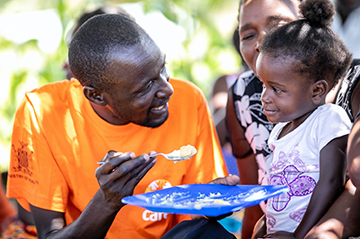
A “gender champion,” Chilufya equally shares household responsibilities including preparing food. Photo credit: Karin Shermbrucker/CARE
Like many men in his rural community of Mpepo in northern Zambia, Chilufya, 48, once did little around the home to care for his wife and 7 children. All that changed when he became a “gender champion” under CARE Canada’s Southern Africa Nutrition Initiative (SANI). This included speaking to “male action groups” about equally sharing household responsibilities, including preparing and preserving foods, as well as talking about their nutritional values. And he leads by example.
“I now cook, wash plates and involve my wife in decision making,” says Chilufya, noting that through the project the couple learned to “work together for one cause—the family.”
From 2016 to 2021, SANI helped to improve the health and nutrition of women, girls, families and communities in Malawi, Mozambique and Zambia. The project is continuing under special provisions related to the COVID-19 pandemic. It is among several CARE initiatives supported by 抖淫视频 that promote gender equality by helping to right the imbalance in the division of labour in households.

Chilufya helps in cooking demonstrations and seed distribution to gain knowledge of nutrition. Photo credit: Karin Shermbrucker/CARE
“We need to change social norms,” says Brenda Siajunza, CARE Zambia’s gender coordinator. This includes “winning the hearts of traditional leaders” to change laws and question customs that prevent women from owning property and make them the property of their husbands, she says. “When women are not economically empowered, they become victims of all forms of gender-based abuses.”
Practical measures under the project included the construction and rehabilitation of conveniently located water points, which reduces the time spent by women and girls on domestic work. Catherine Pongolani, manager of SANI, says another factor has been involving men and women in activities that support nutrition and maternal and child health.
Stereotypes about domestic roles are challenged through male role models like Chilufya, she says. Action groups sensitize men and women on the need to distribute domestic work more equitably, while avoiding harmful practices such as the tradition that husbands eat first. “It means changing behaviour, and it takes time,” Pongolani points out.
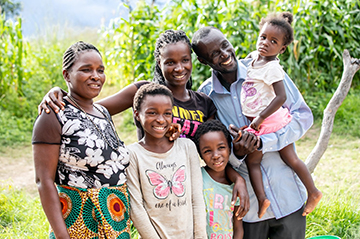
Chilufya supports his wife, working together for their family. Photo credit: Karin Shermbrucker/CARE
In Vietnam, a project implemented through CARE Vietnam and 5 local partners is focused on improving the economic well-being of ethnic-minority women in 2 poor and rural northern provinces of the country. Women in the mountainous region are burdened by caregiving responsibilities and they lack decision-making power in the household and public sphere.
“This limits their time available to participate in things outside the home, such as technical training, networking and paid economic activities,” says Leanna Buisman, CARE Canada’s manager for the project, called Advancing Women’s Economic Empowerment in Vietnam (AWEEV).
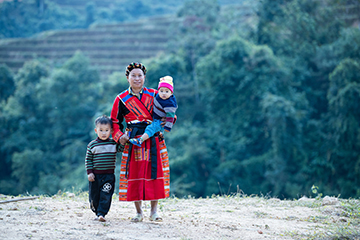
Women in northern Vietnam are burdened by caregiving duties. Photo credit: Vu Ngoc Dung/CARE - 2021
One focus is to upgrade a cookstove commonly found in homes in the region. Called the “iron bar,” it uses a lot of firewood, given its low thermal efficiency. “We found out that women are the main firewood collectors in their households and they encounter all kinds of difficulties when collecting it,” Buisman explains. The stove also causes a lot of smoke and dust, which is harmful to the household’s health, particularly to women, who do the cooking. AWEEV is recommending improved cookstoves such as one that it made from concrete, which increases thermal efficiency, she says. “There are a lot of potential benefits from the simple solution of upgrading a household appliance.”
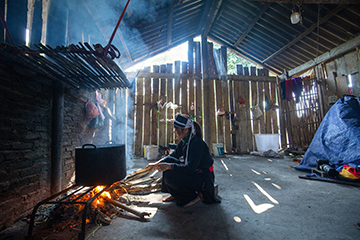
The “iron bar” uses a lot of firewood and causes a lot of smoke and dust. Photo credit: Vu Ngoc Dung/CARE - 2021
She says AWEEV is doing an innovative study to measure men’s and women’s time use, to understand the root causes of the unpaid care imbalance and attitudes surrounding it.
The study results will be shared with Vietnamese government authorities at the district, provincial and national level, Buisman says. CARE plans to facilitate dialogue with small groups of men and women on issues such as the understanding “that women should be primarily responsible for child and family caretaking,” she says. One of the project’s goals is developing women-led social enterprises “that inspire other women to exercise their economic rights and increase their economic well-being.”
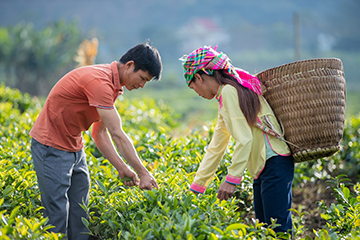
For women in Tam Duong, Vietnam, working in the tea fields raises income for the family. Photo credit: Vu Ngoc Dung/CARE - 2021
If the women of northern Vietnam begin to participate more in paid economic activities, Buisman hopes that others around the world “will be encouraged to follow in their footsteps.” Although the lived experience of Vietnamese women may be very different than that of Canadian women, there are “shared challenges” that those in Canada can relate to, she adds. “The expectation that housework and childcare is the primary responsibility of a woman is still very much the case here in Canada, even though it is slowly shifting.”
- Date modified: